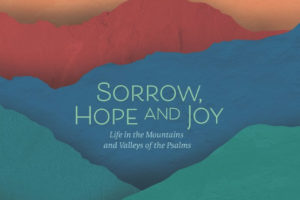The 113th annual Summit will begin this year on Sunday evening and end on Wednesday during Chapel.
“The purpose of Summit is to be a place where conversation is held for life and faith and so it is a time of spiritual renewal,” said Dr. David Wray, director of Summit.
Summit began in 1906 around the name Lectureship. Through the years it has been primarily aimed at ministers, preachers, Bible teachers and other congregational leaders. However, more recently it developed to be more inclusive for students and faculty on campus.
Planning for Summit is a year-long process, Wray said. The theme is normally a book of the Bible and alternates between the Old testament and New Testament. This year Summit will explore the Old Testament book of Psalms. The theme is “Sorrow, Hope, and Joy: Life in the Mountains and Valleys of the Psalms.”
“The world is broken, and because of that there are some really hard things we all face as Christians in the world,” said Leah Andrews, assistant director of Summit. “The psalms give us beautiful language and beautiful history of how to get through those times and how to reach from the sorrow to the hope and to the joy.”
Mike Cope, former adjunct professor in Bible, missions and ministry, will begin Summit Sunday night, with an overview of Psalms. Other theme speakers will speak during Chapel in Moody auditorium. Beverly Ross, founder and executive director of Wise County Christian Counseling, will speak on Monday about sorrow, Shane Wood, author of “Between Two Trees,” will speak on Tuesday about hope and Dr. Steven Moore, associate professor of language and literature, will speak on Wednesday about joy.
This year Summit will again be organized into pathways. Over the three days, Summit will feature 21 different pathways. Each will contain five classes. All classes and events are free except for the Enneagram Next Steps session on Tuesday.
“We are not just trying to reach congregational leaders, we’re trying to really focus on students as well,” Wray said.
The pathways have several benefits. First, they provide better organization of the conference compared to past years. Instead of 100 different classes, pathways allow attendees to find classes they are interested in without much difficulty. They also allow speakers to dive deeper into the subject matter.
“We decided let’s go deeper with more quality than quantity,” Wray said. “Let’s focus this thing into 21 pathways instead of just standalone classes in all directions.”
Second, pathways allow for collaboration with the different majors to create pathways suited for different fields.
The student featured speaker this year will be Mo Isom, author of “Wreck My Life: Journeying from Broken to Bold” and “Sex, Jesus and the Conversation the Church Forgot.” She will speak at 8 p.m. Sunday and at 11 a.m. Monday in Cullen auditorium.
“I love having campus visitors come to campus, then being in a class with a student and watching the two generations start talking and seeing the barriers come down, and I think it’s beautiful to see generations mix like that,” Andrews said. “I think that’s how we grow more understanding and compassionate with each other.”
The ACU connect app has a guide for Summit and all presentations as well as evening activities will have QR codes for Chapel credit.

